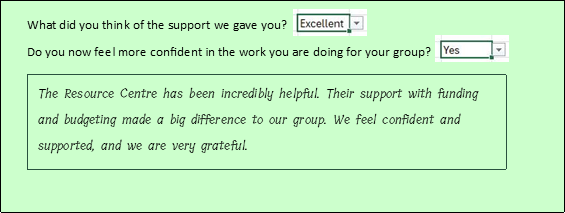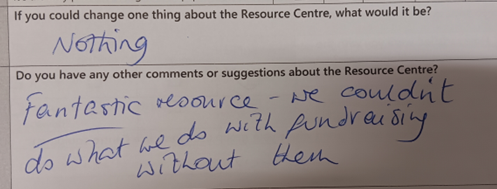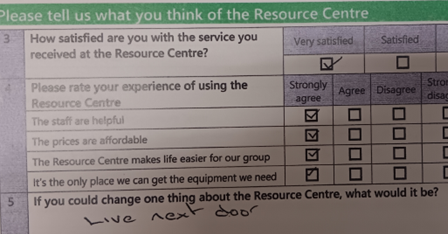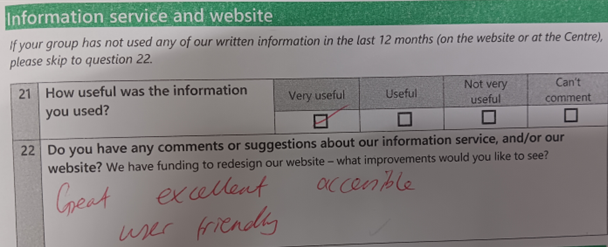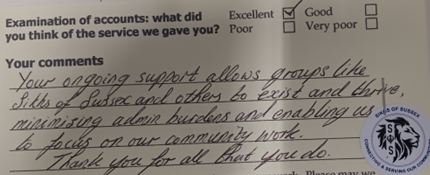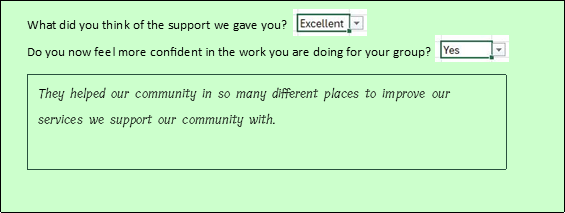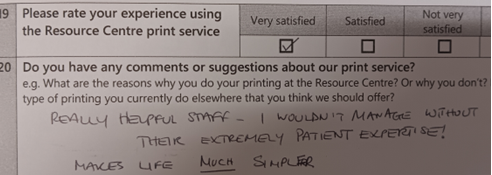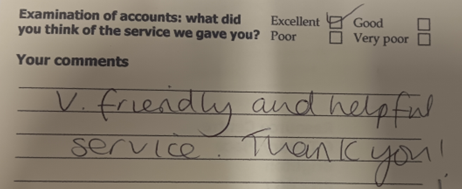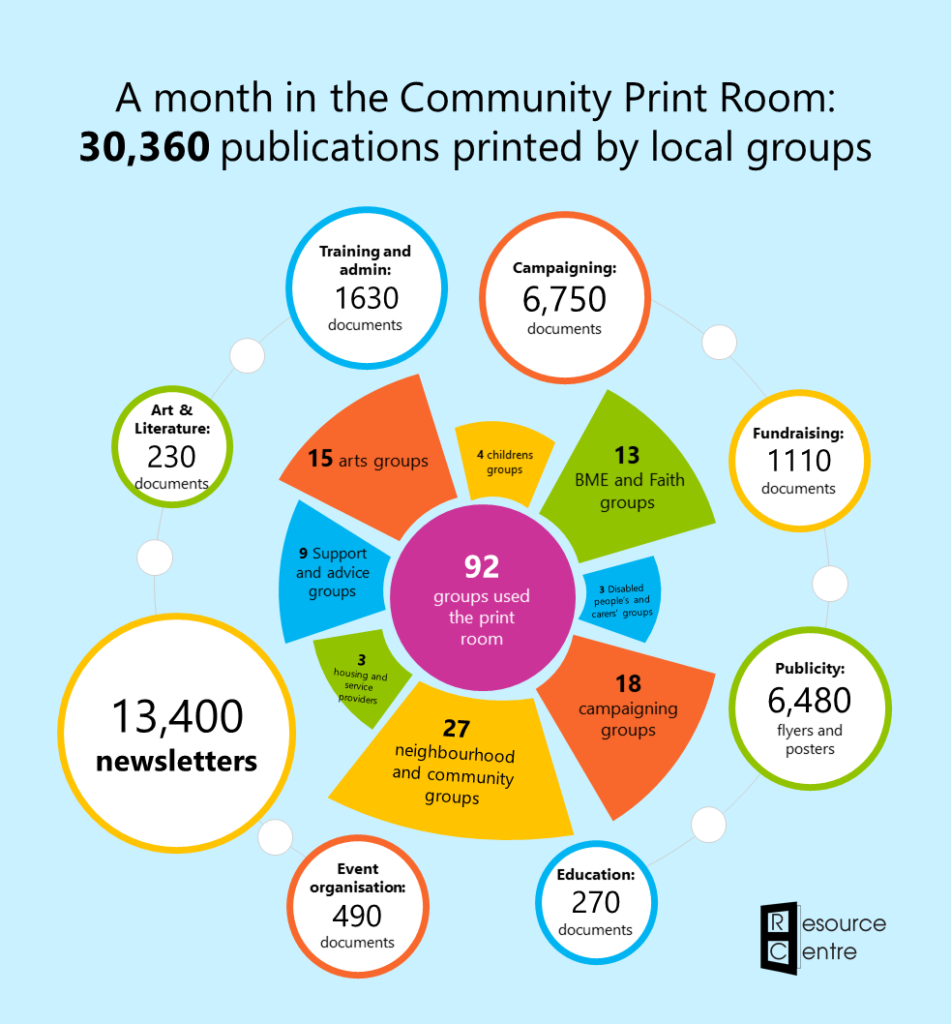A learning organisation: how we evaluate our work
All our services have been developed over the years as a result of requests from local community groups, and learning from the experiences of our user groups is vitally important to us. It is how we know whether we are doing a good job, whether our services are meeting our aims and what we need to change. We actively seek feedback in all our work.
Our feedback and evaluation process draws together:
- informal feedback from conversations and comment cards at the front desk
- a snapshot survey every two years
- evaluation forms sent to member groups after completing each substantial piece of support work or examination of accounts
- case studies of the impact of our work
- reflective discussions within our staff team
- strategic discussion and policy decisions by the management committee
Our own survey
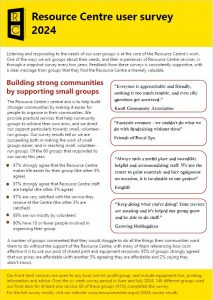 Every two years we ask every group who uses us over a four week period about their experience with us. Our most recent survey was carried out in June and July of 2024. Over the six week survey period, 146 different groups used our front desk for at least one service. 60 of these groups (41%) completed the survey.
Every two years we ask every group who uses us over a four week period about their experience with us. Our most recent survey was carried out in June and July of 2024. Over the six week survey period, 146 different groups used our front desk for at least one service. 60 of these groups (41%) completed the survey.
Feedback from our surveys has always been consistently supportive, with a clear message from groups that they find the Resource Centre extremely valuable.
Our 2024 survey painted an overwhelmingly positive picture of how groups experience the Resource Centre. Our services, and the responsive and personal way we deliver them, are extremely useful for groups. Of the 60 groups that filled in our survey:
- 100% agree that Resource Centre staff are helpful
- 98% agree the prices are affordable
- 100% agree that the Resource Centre makes life easier for their group
- 72% agree the Resource Centre is the only place they can get the equipment they need
Resource Centre services are specifically aimed at small, volunteer-run groups based in Brighton and Hove, and our 2024 survey confirmed that we are succeeding in reaching our target audience. Of the 60 groups who filled in the survey:
- 69% are run mostly by volunteers
- 80% have 10 people or fewer involved in their organising meetings
We asked our user groups to describe what they do in their own words, and we were told of community centres, play streets, refugee and migrant support, advice services, PTFAs, language schools, green space action projects, arts and theatre activities, sporting groups, food banks, green energy, pride events, youth support, and much more.
What all of our user groups have in common is that they bring people together, directly reducing loneliness and creating opportunities for people to improve their own lives and those of their friends and neighbours.
We pay attention to every comment in our survey. Many groups had suggestions for how we could run things slightly differently, or make our services more accessible or flexible. Our staff team will consider each of these and assess their viability in the broader context of Resource Centre work.
Feedback from our member groups
Each time we carry out a piece of intensive support work for one of our member groups, we ask for feedback and comments. In 2024-25, we did 48 examinations of accounts and 287 support sessions for our priority groups.
Examinations of accounts
“Thank you so much for your attention to detail and thoroughness on this! I’m happy with all the changes and grateful you picked them up. I know you have gone above and beyond to get this back to us on time for submission, and it is really appreciated.”
Amigos Multicultural Pre-School
We give groups a postcard to return with a rating of our work and any comments, when we complete the examination of their accounts. 40% of the cards we gave out were returned and 100% of these rated our work as excellent.
Support and advice
When we spend at least an hour with a group, providing support and advice, we contact them a few months later to ask for feedback.
In 2024-25, 17 groups responded to our feedback requests. 94% rated our support as excellent, and 94% said they felt more confident in their group work as a result of our support.
Case studies
We produce occasional case studies to highlight particular aspects of our work.
Member group responses to the Covid pandemic, 2020-22
- We produced a report in May 2022, reflecting on the work of the Resource Centre and our member groups in 2021-22
- In September 2022, we published a report on a series of interviews with residents associations, focusing on the impact of the pandemic on their activity and their support needs
Third Sector Investment Programme, 2017-20
As part of our monitoring for this funding from Brighton & Hove City Council, we produced the following case studies:
- 2018: Christian Arabic Club (PDF)
- 2018: Equipment hire by school PTAs (PDF)
- 2019: Brighton & Hove Mediation Service (PDF)
- 2019: PA equipment hire (PDF)
- 2020: Fundraising events (PDF)
- 2020: A month in the life of the Community Print Room (PDF)
Clinical Commissioning Group, 2017
In 2017 we produced two case studies showing examples of small groups whose work makes an important but often unnoticed contribution to the health and wellbeing of local residents:
- Invisible Voices (PDF)
- Sunday Assembly (PDF)
Money in Mind project
Our Money in Mind project was evaluated twice by independent consultants – half-way through the project in 2012 and again at the end of the project in 2014.
On both occasions, the consultants’ report concluded that:
- Groups found the support offered by the Money in Mind project to be of excellent quality, and all beneficiaries would recommend the service to their colleagues and friends.
- A large majority of groups who received support from the Money in Mind project reported that their skills, confidence and knowledge had improved following the support.
- A majority of groups reported that they were better able to raise funds following the support they had received.
Three of the six case studies in each report featured groups who had received support from the Resource Centre (the other three had been supported by our project partners, Impact Initiatives). In the 2012 evaluation, these were:
- Tarner Yoga (PDF)
- Moulsecoomb Bangladeshi Womens Group (PDF)
- Oromo Community and Salaam FC (PDF)
In the 2014 evaluation, they were:
- Oromo Community (PDF)
- Sudanese and Arabic Speaking Elderly Association (PDF)
- Moulsecoomb Treasures (PDF)
To read these case studies in context, and see the results of the online surveys, see the full 2012 evaluation report (PDF) and the final evaluation report produced in 2014.
Last updated: June 2025

